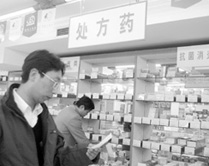
Starting from Thursday, nobody can buy antibiotics in a non-official OTC Catalogue without a doctor's prescription. The directive is part of a nationwide campaign launched by the State Food and Drug Administration, aiming at urging the public to take medicines in a safe way by reducing the negative impacts of excessive and inappropriate drug taking.
According to the regulation, people will need to have a doctor's prescription to buy about four hundred types of antibiotics in five categories, including antituberculotics, antimycotics and sulfa drugs.
An official from the State Food and Drug Administration Bian Zhenjia explains:
"Among the case reports of side-effects from using drugs we receive every year, more than half of them are from using antibiotics. Selling and using antibiotics by doctor's prescription will reduce these side-effects, especially the severe ones, and ensure the safety of people who need to take drugs."
The five categories of antibiotics account for about one fifth of the total sales volume of a typical drugstore. Many drugstores are fully prepared for the change.
"We have set up a special counter for more than two hundred kinds of OTC antibiotics. And all our employees have been given professional training."
Most pharmacies are strictly abiding by the new regulation.
"If you don't have the doctor's prescription, I can't sell you the antibiotics, not even a single capsule. You should see the doctor first and get a prescription. Then you can buy the antibiotics the doctor prescribed from the hospital pharmacy or from drugstores."
And many customers have accepted the change.
"I think it's very good for patients. Following doctors' prescriptions can prevent patients from taking the wrong medicine and ensure their safety."
But some chronically ill people have been taking a certain kind of antibiotics for a long time. They are used to buying them directly from drugstores. So they feel inconvenienced that they now have to see the doctor and get a prescription before buying the same medicines.
"I just wanted to buy some antiphlogistic. I have a sore throat and I know what medicine I should take. But now I have to see the doctor first. I don't think it's worth my while to go to the hospital just for a prescription."
Actually, according to relevant regulations, people can buy antibiotics with any registered doctor's prescriptions. They don't need to go to hospitals to get prescriptions. Therefore, some drugstores have taken this opportunity to promote their own clinics.
"We have our own chief physician. If residents want to buy antibiotics, they can come to our clinic and our chief physician will write a prescription for them, so that they can buy medicines with the physician's prescription."
In China, a large number of medicines are available at chemists without prescriptions. It means people buy medicines according to self-diagnosis and many regard antibiotics as a panacea. China is on the list of countries which abuses antibiotics. Antibiotics make up 10 of the top 15 most used medicines in the country.
Statistics show that nearly 2.5 million Chinese are hospitalized every year due to adverse reactions to medicines. Excessive antibiotic use is responsible for half of the country's hearing impaired cases.
About 200,000 people die each year from taking the wrong drugs. And about 40 percent of that number can be attributed to taking antibiotics indiscriminately.
On the other hand, doctors regularly prescribe antibiotics for coughs and headaches with little or no attention paid to actual cause. Others will give patients antibiotics three days before operations in order to reduce the chances of post-op infection. Antibiotics purchased by hospitalized patients in China account for 50 percent of that of the national total, far exceeding the international average of 15-30 percent. So it seems the prescription of antibiotics also needs regulation.
(CRI July 2, 2004)
|

